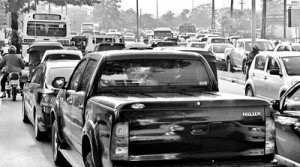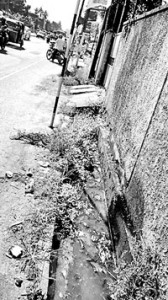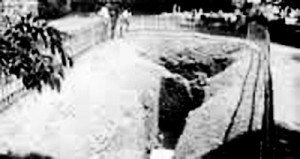Letters
View(s):Policeman, policeman do your duty; don’t switch off traffic lights
We have experienced huge traffic blocks in Colombo and the suburbs recently. The reason behind this is nothing other than the traffic police controlling the traffic themselves by switching off the traffic lights in every junction.
As we have noticed, from very recently, the traffic police switch off all traffic lights at every main junction and take control of diverting traffic as they want in peak hours of traffic.
There are no specific time limits, neither is there proper coordination with vehicle movement and this causes huge traffic blocks.
As we have observed, most of the time, the traffic police send one side completely and therefore all the other sides get blocked resulting in long queues in the metropolitan area.
It’s really sad that when other parts of the world are adopting methods to control traffic by using automated processes and computer controlled hi-tech methods we Sri Lankans do it manually though the resources are available up to a certain extent.
Basically, we are going backwards and adopting manual methods when hi-tech equipment is available; we are not making proper use of it.
Now, most of the junctions get clogged, normally due to traffic police controlling the traffic manually where there are traffic lights available. These traffic lights were operating with predefined time limits to each side.
Therefore, the blocks were there but not to the existing level. Now, all we need is to fix a small circuit to the existing traffic lights to monitor the congested side and to release automatically, using hi-tech automation processes and not by going backward to 19thor 20thcenturies to control the traffic manually.
I remember a student from a rural college and a group of students from the University of Moratuwa developed a circuit to monitor and control traffic.
This small circuit can be fixed to the existing traffic lights to keep an “eye” on the sides which are getting clogged to release and control traffic in a very easy and efficient manner.
But, it’s really sad that the officers in charge or government has not looked into this and promoted these types of devices to make matters very easy and encourage these inventors.
As tax payers, our money is used to fix traffic lights in the city of Colombo and as motorists we are wasting productive time on the roads due to this very silly decision taken by traffic police to control traffic manually.
I urge the Inspector General of Police and top traffic police officers to look into this in a more productive way and make use of the available resource by modifying their beat a little bit to suit the conditions with the help of electronics, hi-tech equipment and by using the resources of the students of the University of Moratuwa.
Until these new modifications are done, please make use of the existing traffic lights to work as it is and please stop the traffic police controlling the traffic manually which has made matters worse than ever before.
Manjula C. Ranasinghe
Colombo
There’s traffic at any time of the day!
Traffic congestion in the city has become increasingly bad in recent months. No particular reason can be adduced for this but motorists are facing immense inconvenience in their day-to-day activities, being unable to reach their destinations on time.
Earlier, traffic congestion was mainly at school and office opening and closing times but now we find that it is much more even at other times. So much precious time is thus wasted on the road not to mention the wastage of fuel.
At junctions, roundabouts, cross-roads and traffic lights, undue delays are caused with vehicles crawling in a long line. Add to this the fact that motor cycles and three-wheelers try to creep into the small spaces in between the cars causing danger to other road users.
There are so many different types of vehicles on the roads and we see no proper order or discipline maintained when turning, overtaking etc.
We also see public service vehicles not obeying the traffic lights and using their horns very loud. This is a danger at pedestrian crossings.
The probable cause of this type of traffic congestion is mainly due to delays at traffic lights, disorderly traffic movement, dangerous overtaking, excessive speeding, sudden u-turns being made especially by three wheelers, lack of lane discipline and buses stopping in the driving lane to pick up passengers.
Motorists are also ignorant of the Highway Code. Unless the proposed traffic plan for the city is introduced and these aspects are corrected, traffic congestion will not be eased.
B.G. Jirasinghe
Narahenpita
Stop noise pollution- ban air horns
It was decided by the previous Government to look into noise pollution in the country and expensive equipment was purchased to measure the sound emission levels and take action against the violators.
We have neither seen any of this equipment being used on the roads nor any reports of drivers being fined.
We cannot understand the logic of purchasing high priced equipment because it is so easy to identify these violators without equipment. How? Anyone who travels by bus can identify them. They are buses fitted with air horns.
In the early days of our life, air horns were used by buses plying through cities like Habarana for the sound to keep elephants away. But now these horns are used to attract people in bus stands.
It’s time these so-called environment experts look at the basic way of using their ears and common sense to eradicate the harm caused by noise pollution. The main violators can easily be identified.
The solution for noise pollution is very simple… ban air horns!
C. Peiris
Via email
It is incorrect to refer to Buddha as Lord Buddha
The Chief Guest addressing the gathering at a National Day Reception hosted by the Ambassador of an eastern nation, referred to the Buddha as Lord Buddha, not once but several times, in his prepared speech.
“Lord” means master, ruler or feudal type superior. The word also refers to God. The Buddha does not fall into any one of those categories.
“Buddha” in fact, is not a proper name, as such. It is a generic noun to refer to one who has attained supreme enlightenment and who helps others to achieve enlightenment through his teachings.
Siddhartha Gautama, a Kshatriya Prince renounced his kingdom and the princely lay life to attain enlightenment.
He was a man who attained Buddhahood. The Buddha said to his followers “I am just one of you. I never force anyone to listen to me and do not want anyone to obey me.”
The Buddha encouraged doubt, discussion, exploration and questioning of his teachings. He wanted people to follow his teachings only if they were convinced they were good and true.
The word Lord has come to be used as a result of Hindu influence based on the Hindu concept that the Buddha was a reincarnation of Hindu God Lord Vishnu. It has no relevance to Buddhism.
Hence it is not correct to refer to The Buddha as Lord; Sakyamuni or Samma Sambuddha are the appropriate terms. The Maha Nayakes and the Buddha Sasana Ministry should set the guidelines in this regard.
Upali S. Jayasekera
Nawala
Promote the sale of local products
The new budget has laid emphasis on local products. But to what extent do shop and supermarket owners react to make a genuine effort to sell locally manufactured products in preference to imported products.
Recently two torch batteries were purchased from a reputed supermarket with sales outlets all over the country and they were made in China.
On the previous occasions too, from the same supermarket, the two torch batteries purchased were manufactured in Indonesia. On both occasion, the supermarket racks were combed looking for locally manufactured batteries.
In the same supermarket, during periodic purchasing visits, looking for bees’ honey, a young sales assistant girl picked and offered an imported product.
When informed that my choice is a local product, and I prefer the Uva bees’ honey, she promptly produced from the same rack, a product from Uva.
The sales girl was made to understand that in purchasing imported products, while quality local products are available, the purchaser indirectly pays the wages of foreign workers, while in purchasing any local product the purchaser indirectly pays the wages of local workers and also helps to increase the local production and perhaps provides new employment opportunities for a few others.
The new budget’s emphasis is on MSME local production, but unless state sponsored due publicity is provided encouraging the preferred purchasing of local products and encouraging the selling of local products, granting of concessions and numerous facilities cannot promote the national MSME production ideology.
Many an affluent person would prefer imported soap and other brand named imported products, in preference to a quality local product. For the last three decades, this writer has used locally manufactured soap, electric bulbs and many other local products of a significant quality.
In 2011 a locally assembled table clock and about two years ago a similar table clock was purchased and is still in good working order. But a Chinese imported clock could not be used for than a few months.
For my use I shopped for an imported Japanese ‘baby fridge’ but at the reputed shop’s suggestion their own locally assembled baby fridge with their five letter name displayed on the door was purchased, priced much below the imported fridges. But these clocks or the fridges are not advertised in newspapers or on TV.
During the forthcoming Christmas season, shoppers should make every attempt to purchase local products for the festive season.
Thus to promote local production and retail sales the state should periodically publicise, bearing the cost in all three languages, promoting the MSME culture.
Kasi Silva
Don’t waste depositors’ funds and time
Despite many articles being published in the Sunday Times with regard to the sorry plight of the poor depositors of F & G Property Developers, the Board of Directors of the Trust Fund appointed by the Supreme Court around March this year, appear to be unconcerned .
The sad part is that they are behaving just like the politicians who go around pleading for votes from the voters prior to elections and thereafter expect the same voter who elected them to power to treat them like demi-gods.
Should not the depositors be made aware of the present status of funds? Should not the depositors be informed as to the cost (expenses) per month to maintain all the officials?
How much has it cost to construct their new offices? Already over Rs. 100 million has been eaten up.
How much more has to be spent for the depositors to receive the 100% that was promised from platforms, at meetings organised by the same Board of Directors? Should not the Audited Accounts be published, at least on the notice board for the information of the depositors?
The depositors want all assets sold, not time wasted with investors, and that whatever monies available are returned on a pro rata basis, without wasting the depositors’ cash any more.
I finally request and urge the Chairman of the Board of Directors to reply and provide answers to the depositors and public.
A disgusted depositor
Via email
Highway at Urubokke flooded
On November 25 some sections of the newly built highway at Urubokke in the Matara District went under water, as the adjoining canal overflowed and road users had to undergo untold hardships.
We request the relevant authorities to take prompt remedial action to avoid such mishaps.
P.H. Masmulla
Urubokke
Drain that may well be a dengue den
The road-side drain in the picture, is on Galle Road – Kalutara North, right beside an area frequented by many foreign tourist who flock to this coastal resort town. It is full of stagnant water even during the dry season. All types of mosquito larvae can be seen frolicking in it.
Even though the residents have complained to the municipality, and even approached Health Officials, the RDA that built the drain, has turned a deaf ear to their request for a re-grading of the slope of the drain.
This would resolve the stagnation of rain water immediately.
Lack of supervision of the subcontractor who constructed the drain maybe the root cause of this problem. Must the indifference of officials, coupled with the habitual turning of a blind eye, jeopardize the health of the locals and tourists alike?
With “Dengue” hemorrhagic fever a major threat, some action should be taken without delay.
Said Dias
Via email
Enjoy the wild life at your doorstep when you can
Turning to the letters page on Sunday, the cartoon of monkeys on a roof made me smile. However, the accompanying letter made me feel sad. We should all give consideration and kindness to creatures of all species.
I understand that Buddhist civilisations teach respect for all forms of life.
Yes, this country like countries all over the world is over-populated. This is a human fault. I expect that the human population outnumbers the monkey population.
The writer says the animals are running wild. Yes they are wild animals but because so much land has been taken over by us humans they like other animals have lost much of their natural habitat.
I sincerely hope that the President as the Minister of the Environment will, as far as possible, think of the environment first.
Sri Lanka is a wonderful country. Few people in other places of this world have such a diverse amount of natural interest in their own garden or plantation.
I live here and last year enjoyed a lot of fruit from the trees. This year a troop of six purple faced leaf monkeys moved in. We have had little fruit this year but the pleasure the monkeys have given us is well worth the loss of some fruit.
May I suggest that the writer sells his TV and buys a pair of binoculars. To observe the wild life around, would make for a much happier life. We are all part of a wonderful world; let’s enjoy it and not try to eradicate other species.
Angela Moore
Via email
Time to revive devotion to St. Mary at historical site in Jawatte

The holy well that was discovered during excavations
In 2002, the Archaeology Department identified the place where the shrine of Our Lady of Deliverance once stood. This spot is now a cemetery in Jawatte.
It was known in the past as Marapety where stood a chapel in which there was a miraculous statue of Nossa Senhora do Livaramento as per the Augustinian records maintained during the Portuguese era.
The foundation of the chapel, the steps leading to the Holy Well and what is considered the country’s oldest Roman arch was unearthed at this site.
These had been buried for over a hundred years and the statue of Our Lady of Deliverance belonging to the Portuguese era, had remained safe.
The statue had been removed to Goa in India by the Augustinian monks who had been in charge of the shrine. Now that the place of the Holy Shrine has been marked and located and that the Statue of Nossa Senhora do Liveramento is with us once again, it is timely that the Archdiocese of Colombo should commence adoration and reverence to the faith of Our Lady of Deliverance and hold healing services as in the past.
It is recorded in Church chronicles that the water in the well that was believed to be blessed was used to treat expectant mothers and the disabled.
Steps leading to the ancient shrine and the well are still visible in the Catholic section of the cemetery at Jawatte There is a notice board maintained by St. Peter’s College to say that once a Church of St. Mary stood there.
It was one of the 13 Marian shrines that existed during the Kotte period when King Dharmapala was ruling in the 16th century as recorded in Portuguese historical literature.
In 2001, Dr. Siran Deraniyagala, former Director General of Archaeology gave instructions to commence excavations in the cemetery assisted by his Deputy Dr. Nimal Perera, with late Rev. Dr. Don Peter and Rev. Felician Perera, then Rector of St.Peter’s College assisting them.
The excavators unearthed a well, the old Roman arch built of Kabok and the steps leading to the Holy well that were parts of the shrine. There were also some coins belonging to the Dutch and the British periods found within the premises.
The then Department of Christian Affairs allocated some funds for the restoration of the well, the steps leading to the well and repairs needed to the ancient Roman arch.
The late Rev. Dr. Don Peter, author of the text ‘Historical Gleanings’ states that Queyroz has written about this shrine located in Mapane which is the original name for Marahenpita, subsequently changed to Narahenpita. He says that the statue of Our Lady of Deliverance was held in great devotion and drew large crowds of pilgrims.
The Catholic section in the Jawatte cemetery is understood to be under the administration of the shrine of St. Mary’s Bambalapitiya and it is the wish of the Parish Priest to see some chapel or grotto or a monument there to revive the devotion to St. Mary. Rev. Fr. Dr. Xystus Kurukulasuriya is the Colombo Archivist, stationed at the Archbishop House working on heritage matters of the Church.
The ancient festival of Our Lady of Deliverance is to be revived this December according to Parish Priest Rev. Felician Perera O.M.I.
Bandula Nonis
Via email
| Letters to the Editor ‘Letters to the Editor’ should be brief and to the point. Send them to: Please note that letters cannot be acknowledged or returned |


